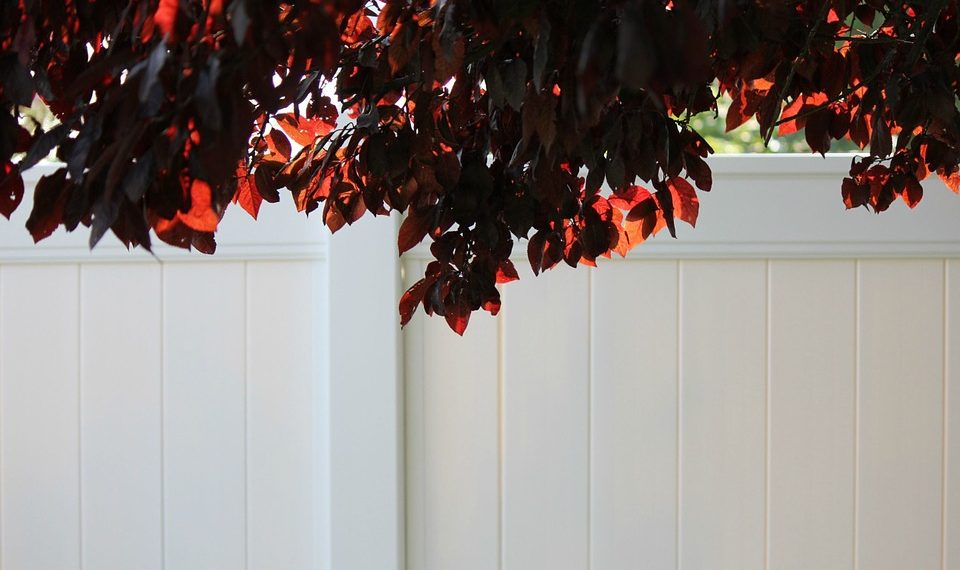Wood fencing
In Ottawa, the extreme winter conditions put a remarkable amount of stress on our fences, especially those made of wood. Natural wood typically requires the most maintenance because it runs a higher risk of being damaged. During fall and winter months it is important to keep debris, especially leaves, off of your wood fence. Wet leaves and debris can cause your fence to warp and rot through the winter. You’ll be surprised by the amount of gunk, dust, mildew and other debris that can be coated on your fence. If you have a pressure washer, use it to spray clean the the debris. Short of that, good old fashioned elbow grease along with a sponge and some soapy water should do the trick. Waterproofing your wood fence can also help keep it in excellent condition for when spring comes around.
Consider painting or staining your fence. When selecting your paint or stainer, look for UV resistant types that will help protect your fence from the sun’s harmful rays. If you decide to paint your fence, a best practice is to prime your wood beforehand. A good primer can add years to your fence’s lifespan, saving you money and increasing the value of your home. After you’ve applied your primer, allow it to dry completely before applying your paint. When painting, we suggest you use a brush or a roller to apply the paint as opposed to spraying, which can be difficult to apply consistently. Start by painting the top of your fence and work your way down. Use a piece of cardboard at the base of your fence so that you can quickly paint the bottom without worrying about painting your grass or mixing mud into your paint.
Vinyl / PVC fencing
Vinyl fencing requires the least amount of maintenance of all the fencing materials. Vinyl is very durable and never needs to be sanded or repainted. The best thing you can do to maintain your vinyl fence this fall is to rinse it with soap and water when you notice that it’s covered with dirt and debris. Routine maintenance will not only help keep your vinyl fence looking great, but it will also help make it last longer. Due to weather related reasons, such as freezing and thawing, vinyl fence post caps can become loose. To keep the beauty of your fence up use plastic fencing glue to secure the caps back in place.
Iron fencing
Iron fencing also requires little to no maintenance. However, it can be susceptible to rust from regular moisture deposits without the lack of proper coating. You can fight the usual culprits of rust (Rain, morning dew and snow fall) by covering your iron fence with a clean coat of rust-resistant paint. Along with rust, wrought iron fence is susceptible to dents, deep scratches and chips. To ward off the scratches and chips of the surface of the fence, you need to use rust-resistant finish every year, just to maintain the beauty of the wrought iron fences. When it comes to deep scratches, bending and dents, above method of protection won’t work. We suggest not hanging heavy fall decorations on them and, as always, keep your fence free of leaves and debris.
To make sure your iron fences keep look looking new for years, you can give it a thorough washing with soapy and warm water, at least twice a year. Oil the joints, latches and springs of the fences and then follow up with a wax. Use formulated paint to cover small holes and scratches. Don’t forget to sand away all the scratches with steel wool before painting and allow each layer of paint to get dry before applying another layer, this way you can less the chances of dripping and flaking of the paint.
Chain link fencing
While chain link fence is known for its durability and ability to withstand the elements better than other types of fencing, without proper coating it can easily become vulnerable to rust from moisture. Rain, morning dew, and snow are the usual factors that cause rust. With proper coating of rust-resistant finish, you can easily fight them off. During the fall and winter, leaves and other yard debris can become lodged in your chain link fence, which can cause rust. It is helpful to use a leaf blower to keep leaves out of the links in your fencing. Dirt and grass from the ground accumulating on the fence are major reasons why you would need to clean your chain link fence from time to time. You can give your fence a good washing with soapy water between seasons in order to keep it looking new. Start with a wax and then oil the fence’s springs, latches, and joints, etc. with mineral oil. You can use steel wool to sand away light scratches. While painting, it is important that you let layers dry between one another, or else you will risk dripping and flaking.
Loose nails can become the cause of a bigger damage into your fence if not taken care of on time. Make sure that there are no loose nails on your chain link fence. Tighten all loose screws and bolts. Pay close attention to gate hardware as it gets the most use. If there’s a gate in your chain link fence, make sure that its hinges are rust free. Regularly apply oil on the hinges to keep it rust free. If you don’t do that, opening and closing the gate could become difficult as the hinges start to rust.


